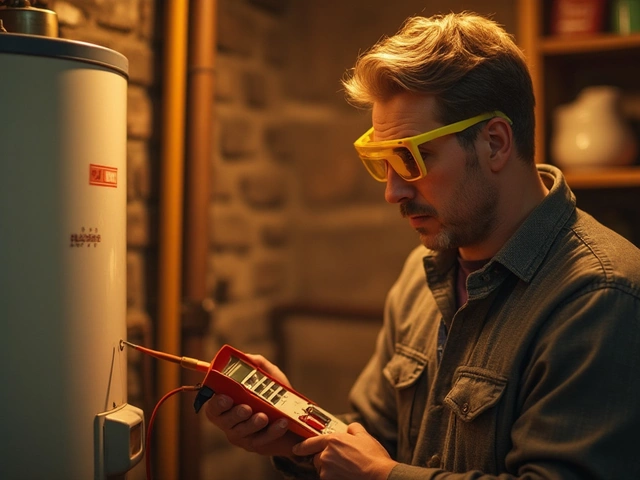Did you know that a faulty fan can cut indoor air quality by up to 30%? That’s why knowing how long a ventilation fan should work matters. Most kitchen and bathroom fans are built to last between five and ten years, but the exact number depends on a few everyday factors.
First, look at the fan’s environment. A fan that runs constantly in a steamy bathroom ages faster than one used only a few times a week. Heavy moisture, grease, and dust build‑up corrode motor parts and wear out bearings. If you notice a musty smell or reduced airflow, those are early warning signs.
Listen for a louder hum or rattling noises – the motor is straining. Also, check the static pressure: if the fan feels weak and your bathroom stays foggy after a shower, it’s losing power. Finally, look at the grille. Cracks, rust, or a warped shape mean the housing is compromising performance.
When any of these symptoms appear, it’s time to decide between a quick repair and a full replacement. Small issues like a clogged filter or a loose screw are easy fixes you can do yourself. A simple filter clean takes five minutes and can restore a lot of airflow.
Regular cleaning is the single most effective way to add years. Turn off the fan, remove the grille and vacuum the vent with a soft brush. Wash the grille in warm, soapy water, dry it thoroughly, and re‑install. Doing this every three months keeps grease and hair from grinding the motor.
Lubricate the motor bearings once a year if the fan model allows it – check the manual for the right oil type. For fans with sealed bearings, just keep the surrounding area dry and dust‑free.
Another tip is to run the fan for at least 15 minutes after every shower or cooking session. This clears out excess humidity and prevents mold from building up inside the housing.
If you’re comfortable with basic tools, you can replace the fan yourself. The guide “How to Replace a Kitchen Extractor Fan Yourself” walks you through removing the old unit, wiring safely, and fitting a new, more efficient model. The whole job usually takes under an hour.
However, if the motor itself is burnt out or the wiring looks damaged, call a qualified electrician. Working with electricity is risky, and a professional can also test the circuit for hidden problems that could cause future failures.
When you finally need a new fan, choose one rated for a longer lifespan – look for models with stainless‑steel housings and sealed bearings. These cost a bit more upfront but can give you an extra two to three years of reliable service.
In short, expect 5‑10 years, keep an eye on noise and airflow, clean quarterly, and replace the fan when the signs stack up. By staying proactive, you’ll maintain fresh air at home without surprising breakdowns.

Discover how long extractor fans last, what shortens their life, and tips to maximize their lifespan in your kitchen or bathroom. Practical, clear advice from real experience.

Thinking about swapping out your electric oven? This article covers how tough the job really is, where people usually get stuck, and what you actually need to know. We break down what tools you really need, what pitfalls you can avoid, and when you should probably call someone who’s done it before. Get ready for straight talk—no tech jargon, just real advice for regular folks. Whether you DIY or call a pro, you’ll walk away ready to make a smart decision.

Extractor fans are crucial for maintaining fresh air and reducing humidity in various parts of a home. When these fans malfunction, it's important to know who to call for repairs. This article guides homeowners on how to find reliable extractor fan repair services. We'll look at why professional help is essential and what to consider when selecting a repair technician.

If your extractor fan has suddenly stopped working, it's not just annoying but can lead to bigger problems like excess moisture and lingering odors. This article will delve into common issues with extractor fans and provide practical solutions you can try at home. Learn about potential causes, from power supply problems to sensor malfunctions, along with straightforward fixes. Some tips might even save you from calling in a professional. Get your fan back up and running with ease!

Diagnosing a faulty hot water heater element can seem daunting, but it's an essential skill for any homeowner. Key indicators like water temperature issues, noises, and prolonged heating cycles are telltale signs of a bad element. This article provides practical advice on how to inspect and test your heater element using accessible tools. Also included are safety tips and maintenance recommendations to extend the lifespan of your water heater.

Ever opened your freezer to find squishy ice cream or thawed food when it should be rock solid? This article digs into the real reasons your freezer refuses to stay frozen, from simple mistakes to sneaky mechanical fails. Learn how to spot common culprits, fix minor issues yourself, and know when things are actually serious. Packed with practical tips and straightforward advice, you'll get the cold facts and solutions you need. No jargon, just help you can actually use.